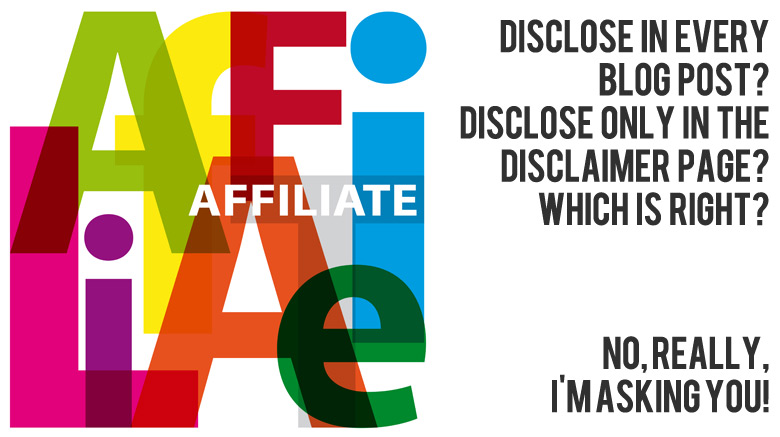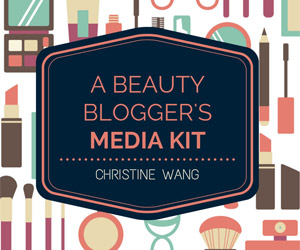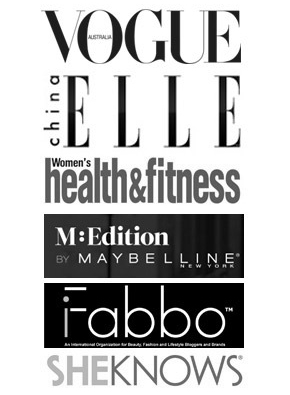
Happy hump day, folks!
I’ve been thinking a lot about affiliate networks and affiliate links lately and rather than just do my usual nightly brain dump on my notebook and husband, I thought I’d do a bit of my brain dump here as well.
I’d to talk about affiliate links today. In fact, I’d love your opinions on affiliate links, both as a blogger and as a reader because it doesn’t only affect our blogs, it affects our readers as well.
As a blogger, do you disclose your affiliate links in every blog post that contain them? Or do you disclose the fact that you have affiliate links in your Disclosure/Disclaimer page but don’t disclose them at the beginning/end of each post?
As a reader, does it bother you if the blogger doesn’t disclose affiliate links in each of those blog posts but he/she discloses them in their Disclosure/Disclaimer page? Is that enough for you?
Have I confused you already?
See, the thing is, I used to do the ol’ tsk-tsk when I see a blog not disclose its affiliate links. They are obviously affiliate links so why not tell us what they are? Can’t pull the wool over our eyes, y’know. Yet for the ones that do disclose, I see the disclaimer in every single post!
I had to wonder: at the end of the day, is it better if the blogger just mention the use of affiliate links in their Disclosure/Disclaimer page and be done with it? Rather than announcing it in every blog post?
Don’t get me wrong; I have absolutely nothing against affiliate links or bloggers making a commission from them as long as they’re genuinely there because the blogger likes the product. Heck, I’m more than happy to buy products off my favourite bloggers’ affiliate links because 1) there’s no extra cost to me and 2) they get a tiny percentage of my purchase.
I use affiliate links too and if you’re unfamiliar with how much money a blogger typically earns from affiliate links, it’s very little, especially if the items are not expensive. As I don’t blog a lot about pricey, high-end products, commission earnings are typically very low. Of course top-tier, big-shot bloggers who make a 6-figure annual salary, they’ll make a lot more from affiliate links due to their influence on their massive audience. Huge audience = increased influence = increased sales = increased commission.
Anyway, I digress.
I’m in a bit of a dilemma because when it comes to disclosure of affiliate links, I’m standing on the fence and cannot decide which side to choose. A week ago, I brought the subject up in a Facebook group and all of the bloggers who chipped in mentioned that they only disclose in their Disclosure page and that it isn’t necessary to do so in every blog post. Then I thought, how is affiliate link disclosure any different to disclosure of products sent for review? You know what I mean?
This is turning out to be a very long and rambly post for Bloggie Wednesday and it’s certainly not my best so for that, I do apologise. I’ve got no tips nor advice on disclosure of affiliate links for you today because I’m rather stumped myself.
Okay, this is doing my head in. I’ll stop here for now. 🙂
I really would like your opinion about this and what you think about affiliate link disclosure. Is it all right to not to disclose in every blog post (providing that it mentions at least a product) and have the affiliate link disclosure in a separate page? Or should we disclose in every blog post? If you’re a reader, do you care if the blogger doesn’t disclose affiliate links in every post but just the Disclosure page? Does it bother you to see affiliate link disclosures in every single blog post? If you use affiliate links, how do you disclose them on your blog?
Am I thinking too much??













Personally it doesnt really bother me that affiliate lnks are mentioned in most posts as most, if not all, of these ‘disclaimers’ are in smaller (not as noticable) fonts. And again, in my opinion, I find bloggers who mention if the link is an affiliate link, very honest and I would actually click these links and support them.
On the other hand, I will google the item up, and not even touch the affiliate link if 1. The item is sponsored (which already causes a little distrust – I feel that people are more honest if its their own bang, but thats just me); 2. It is an affiliate link but not mentioned in the post. Some might argue that I am too harsh or mean but this is just how I do things.
Arguments against are taken into consideration.
Regards,
Robert C.
Oh and I forgot to mention, if I were to include affiliate links, I would probably : 1) at the beginning of the post state that “This post contains affiliate links”, or mention it below together with the links provided~
Thanks for your feedback, Robert. Nah, I don’t think it’s too harsh. After all, in the spirit of transparency, this is how it should be done. Ive been putting disclosures, taking them out, putting them back in, taking them back out … and it goes on and on because I was struggling as to how I should go about disclosing them without annoying the heck out of my readers, you know what I mean?
It doesn’t bother me on bloggers not mentioning affiliate links in every post. It would be good if they did. But I’m more bothered with bloggers not having a disclaimer on products sent for review.
Thanks for your feedback Fiona. I definitely draw the line at non-disclosure of products sent for review. FTC laws or not, US bloggers or not, that should be clearly mentioned in each post, not just the Disclosure page. More and more beauty bloggers have stopped doing this, especially when they get “bigger”. It’s disheartening when you’ve been following them for a while now and see how their practice changes.
I have a general disclosure but for those affiliates that I constantly promote (eg. iHerb), I do it on most of the posts. I think it’s fair to let the readers decide if they want to purchase using a code I proactively promote. I also told them point blank in some posts that I’m making money from their purchases if they use my code but that shouldn’t have to be in every post. I do it because some readers are not very savvy about these things plus there are always new readers.
Thanks for your feedback Sesame. It makes a lot of sense to let the readers decide on whether to make their purchase via your affiliate links or not. I’ve been putting my disclosure in individual posts, taking them out, putting them back in, taking them back out … I think it’s time to properly put them back in. Going to devise a way to make it look tidy, non-intrusive yet it’s there for all to see.
I think it depends on where you are. If you are in the USA and governed by the FTC rules then they require disclosure in every post. For the rest of the world, unless you are covered by a local law, there is in fact, no need to disclose anything at all. So disclosure is a personal thing. I’m not fussed about affiliate links. Non disclosure about gifted products is a whole different ball game though.
Paris B recently posted..Real Techniques Blush Brush : What’s in a name that I may use it for something else besides blush
Thanks Peebs. Product sent for review, oh yeah, there’s no question about it. Disclosure for me is a must for that one. Affiliate links … that’s the one I can’t decide. What if, say, from now, all posts will have affiliate links one way or another? Would it be better to just say it’s on the blog, in the Disclosure page? Or put it in in every post like Temptalia does? Then again, if someone as big as her does, then why not me too eh? *scratch head*
Oh wait, Temptalia has no choice. FTC rules. Ooops. 😛
Haha yep! Temptalia and many big US bloggers have no choice but to disclose. I personally don’t care about affiliate links or that a blogger makes money if I click or buy something from their link. It’s more of the content of the blog post that matters to me. If they’re clearly shilling then I’ll stay away. But if not, I don’t see why they can’t make a buck or two from me.
Paris B recently posted..Marc Jacobs Magic Marc’er : The Precision Pen Waterpoof Eyeliner that is a kind of magic!
In the US, I believe it is a necessity though I have noticed that some of the biggest/most successful bloggers don’t do it. I have unsightly buttons that I use after I introduce the product(s) I’m talking about.
Allison recently posted..Tarte Picture Perfect Lash Curler
Yeah you guys have to disclose regardless due to FTC laws. Having said that, I wish all bloggers are governed by such laws too no matter what country we’re at. What’s wrong with disclosing if the item was sent to us for consideration? I don’t understand why the big bloggers don’t do it, especially the ones based in the US because they’re just fiddling with the law.
See, I don’t really care if the blogs I read disclose if their links are affiliates or not because ultimately it’s up to us to buy the product and that’s how they get paid – not that it’s much. But that’s just me. Sponsored posts though are different and so are products given for consideration – they need to be disclosed. Having said that I do disclose (most of the time because sometimes I do forget) if the links are affiliates – more to cover my arse in case readers were wondering if it was or wasn’t an affiliate link. Like I said, unless it is a pay per click/impression, then really the blogger isn’t making any money from us clicking onto the link and NOT purchasing the product which would earn them commission.
Norlin recently posted..Health & Lifestyle: How to Feel Comfortable At the Gym
Thanks for your feedback Norlin. That’s true; if people don’t buy, normally we won’t get jack. Commission is so little too that sometimes I wonder if it’s even worth the hassle. As for products sent for review or sponsored posts, oh I get my knickers in such a tight twist when those aren’t disclosed when the products are so clearly gifted.
Hi Tine,
I recently started my blog. I haven’t used any affiliate links yet. As a reader, I don’t mind if the blog I read uses affiliate links as long as the blogger genuinely love the product. I actually quite happy to help them to make some money. If a blogger purely did an article to promote the link (which you can tell), then it bothers me. I think it also affect the blogger’s credibility.
As a blogger, I am going to disclose at once in the disclaimer section unless it is a unusual item.
Now, I better start working on my disclaimer. By the way, do you need a lawyer to draft one for you in Australia?
Thanks x
Hi Grace, I didn’t get a lawyer to draft my disclaimer page. I got the general one from this website: http://www.disclosurepolicy.org and then I added the rest on my own. As long as your policy is clear, you don’t need to have legal jargon in your Disclaimer/Disclosure page.
I’m a miserable old bag who HATES seeing the disclaimer on every post – it makes me wonder what about that post was paid for, and when there isn’t anything, it makes me just think the blogger is lazy and can’t be bothered to C&P the disclaimer in when its needed, but not have it as a template all the time – seriously, it takes 2 seconds to either put it in, or delete it out, how hard it that? I can’t see how the US requires you to disclose on a post that isn’t affiliated or sponsored though, that makes now sense, so it goes back to the lazy. (Says the girl who hasn’t done a new blog post forever. Ahem).
The flip side – its only polite to disclose (ignoring whatever the laws say – its not illegal to, for example, have bad breathe, but its polite to not garlic breathe all over your dance partner….), when its needed – transparency means people will believe you more and put more stock in your blog. We don’t do affiliate links at the moment, but have had a couple of sponsored posts, and we just declare at the bottom, although as we would only ever work with brands/sites/etc that we would recommend anyway, hopefully we make that clear too.
Hilary recently posted..Bacon!
Thanks for your feedback Hilary. Sometimes I can tell if the post is sponsored or not (especially when a few bloggers publish their posts at the same time. So if most discloses and you don’t, well there’s your smoking gun) but other times, it can be hard. E.g. a lot of beauty bloggers these days no longer write specifically about just one product, one brand in one post unless it’s sponsored because this gives exclusivity to the brand. They write posts that mention a few products of different brands instead. See, this doesn’t work for me at all. I review single products and while most of the time, they’re not particularly exclusive (i.e. I mention another product in the post), sometimes they can be and those posts are not sponsored at all. That makes it difficult at times but hey, I work at my pace and my style. 🙂
I’ve been thinking about this very thing lately! I have my disclaimer in my ‘About’ page about sponsored posts (not that I’ve done any yet) and affiliate links, and I asterisk all press samples. Sometimes I think that’s enough and other times I don’t (especially when I’m raving about a press sample. I feel like I need to put in ‘this is not a sponsored post’ somewhere on the page?)
I guess I’ll leave it as is for now and see how I feel later on about it… I like Temptalia’s way of marking posts as whether they are press samples and affiliate links, with the buttons on the top right corner of her posts, it makes it clear from the get-go but also unobtrusive to the post.
Angie recently posted..The Look: Eye of Horus
Hi Angie, thanks for your feedback. Personally, the “this is not a sponsored post” isn’t necessary, at least I don’t think it is. I don’t think it has to come to the point where we even have to disclose non-sponsored posts, but that’s just me. I’ve been putting in, taking out, putting back in, taking back out some of my affiliate link disclosures in some blog posts just to test it out. To be honest, I feel very weird not mentioning that they’re affiliate links so I’m going to have to put the disclosure back. Covers my butt, readers know and have the choice to buy or not and I have a clean conscience. Hee hee!
As a reader, it doesn’t bother me at all if they don’t disclose affiliate links.
As a blogger, I used to disclose every little thing but I’ve started doing more affiliates these days and well, I’ve disclosed in my disclosure page but not disclosed in individual posts. Still disclose sponsored posts and pr samples.
And what do you think of the (big) bloggers idea of disclosure of gifted products – “c/o” – I used to find it annoying and almost dishonest but now, I’m over it 😛
Ling recently posted..Me Time AKA Indulging in Whatever Tickles My Fancy
Thanks for your feedback Ling. That’s my struggle; I feel like it’s intrusive to disclose every single thing and think that my readers may think that I want to make $$ out of every little thing. On the other hand, when I don’t disclose affiliate links, my conscience doesn’t feel clear. It’s like damned if I do, damned if I don’t. I think I’m going to put the affiliate link disclosure back in just so I don’t have that niggling feeling. I can’t stand it!
I used to roll my eyes every time I see “c/o” especially when it’s from luxury brands. Now I’m like meh, good on you I suppose. Lucky you to have Givenchy send you a bag to carry. 😛
I’m a reader, not a blogger. I feel like a meanie now but I no longer click on links on blogs UNLESS the blogger specifically mentions in the same post that there are affiliate links. My preference as a reader is to see the disclosure both up front (buttons like what Temptalia has is sufficient) and bonus points for an explanatory paragraph at the end too. The transparency actually encourages me to support the blogger.
The c/o / in collaboration with / working closely with etc bothers me no end, simply because in the past I hadn’t been sharp enough to realize that that meant the blogger was being compensated in some way for that post. I’m not against bloggers being paid for what they do, but I do want to know about the context in which I should evaluate a blog post. IRL I generally have no patience for people who beat around the bush either, so I guess this is a real life bias I’ve brought with me into the online world.
Thanks for your feedback and I totally get what you mean. It’s your choice on whether you want to support a blogger who’s open and transparent about the products he/she gets or the money he/she may potentially make from their affiliate links.
I’ve lost count of the amount of “c/o” collabs in blogs and it used to bother me that they just use c/o instead of a proper disclosure that the item has been sent to them for editorial consideration. If I’m not mistaken, I don’t think you can just use c/o in the US anymore per FTC rules and that they have to mention that the product was sent to them for review. I may be wrong of course because NONE of the fashion bloggers I do follow have changed the way they present their blog posts with c/o items. In those cases, I don’t think disclosing in their Disclosure page alone is enough. I’m not 100% about the full extend of the FTC rules so again, I may be mistaken.
As a reader, I don’t care whether a blogger discloses affiliate links or not, as long as the review is honest and both pros and cons are listed. It’s sponsored posts, products received for review, or any instance when the blogger has been compensated by a brand to do something that it’s essential to disclose. Otherwise, they lose some of my trust.
As a blogger, though, I always disclose at the end of the review if it contains affiliate links. When I include them in another types of post, like when I write about an ingredient and mention in what products it can be found, I add “affiliate link” to the title tag, so that when somebody hovers over it, which they’ll do if they’re thinking of clicking on it, they can see that it’s an affiliate link. It’s a way to disclose things that doesn’t make the blog look ugly. I also thought about adding buttons at the top like Temptalia has, but I have no idea how to do that. I’m so not good at coding.
gio recently posted..Book Review: Her Next Chapter By Lori Day And Charlotte Kugler
Thanks for your feedback Gio. Hmm that’s one way to do it too, the “affiliate link” title tag. I’ve never thought of that. I’ll probably just stick to the good ol’ short paragraph at the bottom of each post disclosing my affiliate links until I figure out how to add a button like Temptalia’s.
I always disclose affiliate links in-post because the FTC rules say you have to (I’m in the US). I don’t really see a good reason NOT to disclose affiliate links though … I mean honestly in this day and age I have come to assume that bloggers writing about products will use affiliate links, but not disclosing them (or press samples, sponsored content etc.) makes me wonder about their level of honesty.
Rebecca B. Bird recently posted..Weekly Poll: In a classroom far, far away
I wish all bloggers have to follow similar FTC rules too, not just the US because the sheer amount of bloggers who don’t disclose products sent to them for review or worse, sponsored posts) is staggering. What’s worse is that it isn’t the new bloggers who aren’t disclosing, it’s the big guns. You’d think they’d know better and it astounds me how is it that the US-based ones aren’t in trouble with the FTC yet for their non-disclosure of gifted items or sponsored content?
The thing about the FTC is that they don’t actively monitor blogs for non-compliance – at least not yet. But just because nobody is watching doesn’t mean you should break the rules … that would be like saying it’s OK to steal something just because the shopkeeper is out, haha. And they may start monitoring blogs more carefully at some point, who knows.
Rebecca B. Bird recently posted..Vegan Cuts Snack Box July 2014 Review
I have the idea that disclosing shows blogger’s honesty and I think is only necessary to put a page with the disclose and to little buttons like Temptalia in each post, that way readers know what’s happening in the blog without being overwhelmed with disclosing.
Efraín recently posted..Los imprescindibles en belleza cuando falta tiempo
Yeah that’s true. I’m currently coming up with a way to add similar disclosure buttons on the blog. Fingers crossed it will look okay!
Sorry if I sound like a complete noob, but what about affiliate links in clickable ads that are on the sidebar or bottom of your blog? Do you need to title them ‘Affiliate links’ or do eople just know what they are?
Also, agree that it’s better when it’s disclosed. When I click on a link to buy something and notice the little collection of numbers and letters after the URL and they HAVEN’T said it’s an affiliate link, I immediately delete the code and just use the regular site. If they have disclosed it then I am happy to support them. Lol.. sounds mean! But I appreciate disclosure in every post, I don’t think it’s invasive. I’m not going to go trawling through people’s disclaimers just to see what their affiliate links are. Having said that, if you disclose in your post do you then also need to include the links in your disclaimer as well?
Jeanie recently posted..Easy Banana & Chia Pudding
Affiliate links on sidebars are considered as advertisements so I don’t usually disclose them as affiliate links because they’re clearly ads. For this current theme the blog is on, I have the word “Advertisement” above the affiliate banners but I normally wouldn’t have that written as it’s not necessary.
I didn’t think I disclosed my affiliate links in every blog post (have to check!) but I definitely have it on my Disclaimer page on what they are, how they’re used and how they help me.
i think about this too! i get annoyed putting in affiliate links/pr sample disclosures for everything, but i think that is more because of how it looks visually. So perhaps I need to find a better way! lol.
in any event, i don’t really mind if it is disclosed or not, i think it is pretty easy to tell, no? I don’t use affiliate links though, not bc i don’t want to, but bc i typically use the cash back links from my credit card and i never buy something right away when i read about it. (trying not to be impulsive lol)
you should do a follow up post to this, if you haven’t already. I’m really curious to see what kind of responses you are getting!
Joyce recently posted..Link Love ♡ June & July
Good idea to do a follow-up post, Joyce, thanks for the suggestion. So far, most don’t really care if the affiliate links are disclosed or not although it would be nice if they are. A number suggested the use of buttons that say “affiliate links” or “press samples” etc like the ones Temptalia use. I’m still figuring out how to implement them.
Great post thanks! I’m finally going to add some affiliate links to some of the products I keep mentioning on my site. Just trying to get a feel of how everyone is doing it. I also never mind seeing affiliate disclaimers, in the end I’m going to buy the product if I like it or not.
My pleasure, Julia! I say disclose whenever you can. I’m still figuring out a less intrusive way of displaying the disclosures like the ones Temptalia has.
I’m really enjoying this discussion! Temptalia’s subtle, yet clear, disclosure button inspired me to do some digging and I found out my Wordpress theme documentation listed some button shortcodes I could tweak and use.
One of the original shortcodes looks like this: [button link="URL here" color="grey"]Button[/button]
I just pasted my personalized version into the post content edit box in the Visual mode (not Text), hit update, and there was a lovely button! Definitely worth checking out to see if your theme offers any specific shortcode or finding a way to make your own.
Carla recently posted..Inspired: October 2014
Thanks Carla! I recently tried out the disclosure buttons on the blog too. However, when I ran a reader survey (I’m still running it by the way; if you have the time, I’d love to hear your feedback on the blog too! – http://www.beautyholicsanonymous.com/2014/11/beautyholics-anonymous-reader-survey-2014/), majority of feedback was that they prefer text disclosure at the bottom of the posts and not the buttons so I’m reverting back to my usual method of disclosure. The buttons were nice while it lasted. But if it works well for you, stick with it because I think it’s not intrusive and looks good. 🙂
nice post shared